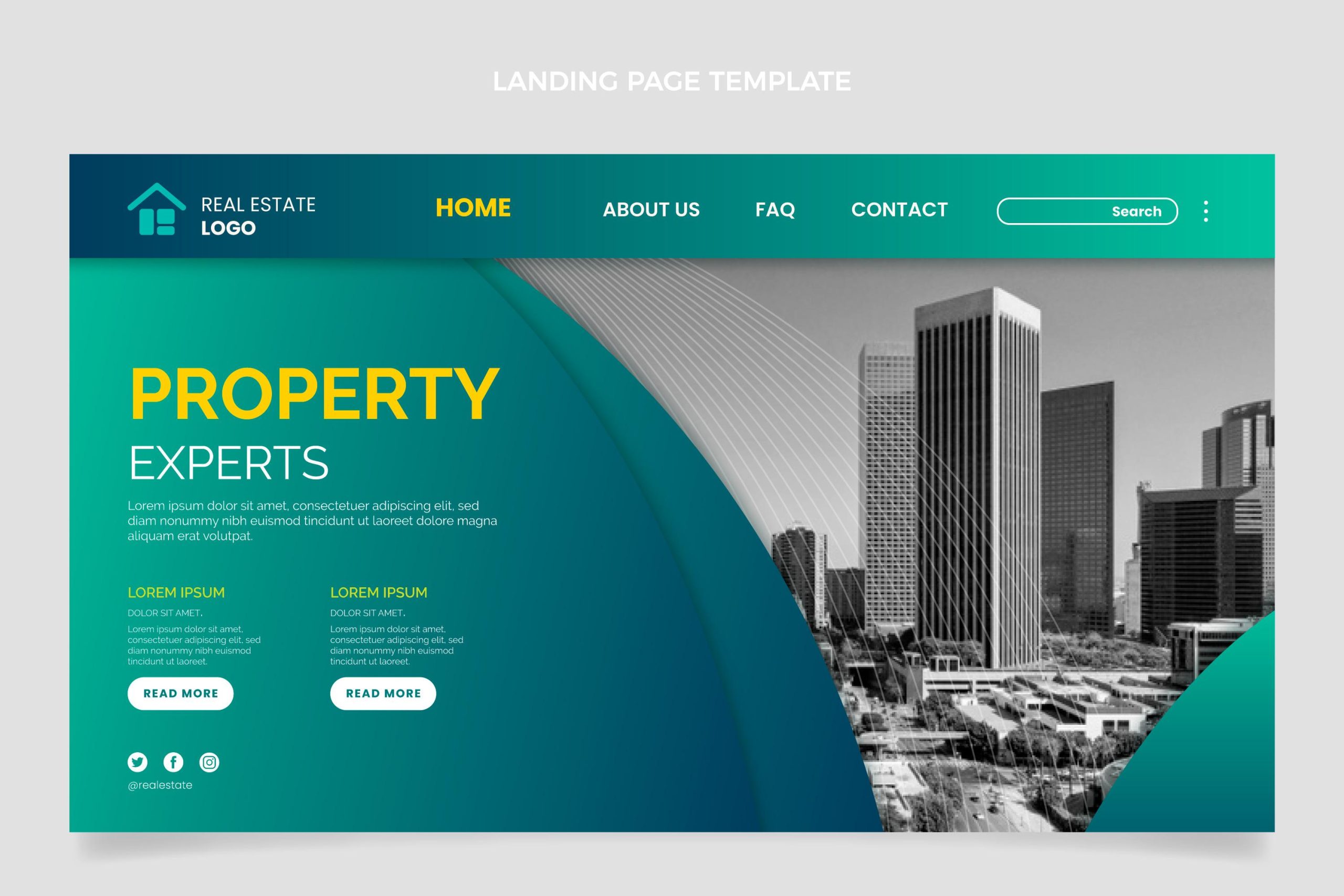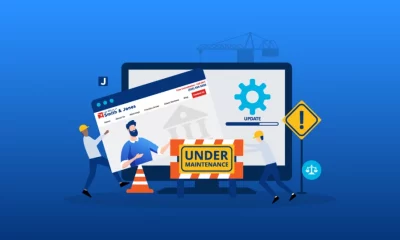Business
Wix vs. Squarespace Guide for Real Estate Websites

The advent of the digital age has transformed various industries, and real estate is no exception. With property searches beginning online and virtual tours becoming the norm, a robust online presence for realtors is not a luxury; it’s essential. As real estate professionals grapple with the nuances of digital marketing, two platforms, Wix and Squarespace, have surfaced as prominent contenders in the realm of website creation. But how do they stack up against each other, especially concerning the unique needs of the real estate industry? This guide aims to demystify this very quandary.
The Digital Real Estate Landscape
The allure of physical property viewings, while still relevant, has somewhat been overshadowed by the convenience of online explorations. Websites now serve as the first point of contact between realtors and potential clients. They’re not just platforms to showcase properties; they’re tools to build credibility, offer market insights, and provide value to visitors. In this scenario, the choice of a website builder becomes pivotal. It’s not just about aesthetics; it’s about functionality, user experience, SEO capabilities, and much more.
Wix & Squarespace: An Overview
At the intersection of ease-of-use and professional-quality stands Wix, a platform that promises intuitive website building. On the other side is Squarespace, renowned for its design-centric approach and polished templates. Both platforms cater to a diverse audience, but their offerings differ, especially when viewed through the lens of real estate.
- Wix: Born out of a desire to simplify website creation, Wix has steadily climbed the ranks, becoming a favorite for many. With a vast template library, drag-and-drop functionality, and a suite of integrated tools, Wix aims to be the one-stop solution for all website needs.
- Squarespace: Positioning itself as the platform for creatives, Squarespace’s emphasis has always been on design and aesthetics. But beneath its sleek exterior lies a powerful website builder, equipped with e-commerce capabilities, blogging tools, and more.

Wix for Real Estate: An Expanded Analysis
Pros:
- Intuitive Interface: For real estate professionals who may not have a background in tech, the simplicity of Wix’s drag-and-drop interface is a boon. It eliminates the need for coding, allowing users to focus on creating compelling content and engaging visuals without getting bogged down by technicalities.
- Template Variety: Wix’s vast template library offers a design for every type of realtor. Whether you’re showcasing urban apartments, rural estates, or commercial properties, there’s a template tailored to your needs. This variety ensures that professionals can find a layout that aligns with their brand image and property portfolio.
- High Customizability: Beyond the pre-designed templates, Wix provides a suite of customization tools. This flexibility ensures that agents and agencies can craft a unique online presence, differentiating themselves in a competitive market.
- SEO Ready: In today’s digital landscape, appearing on the first page of search results can significantly impact business. Wix doesn’t just offer tools for SEO; it also provides guidance, ensuring that even those unfamiliar with SEO can implement best practices.
- Mobile Optimization: With an increasing number of property searches initiated on mobile devices, having a mobile-optimized website is essential. Wix templates automatically adjust to different screen sizes, ensuring a consistent and user-friendly experience.
- Integrated Tools: Wix’s App Market is a treasure trove of tools and extensions. Whether it’s integrating a CRM system, adding chatbot functionality for instant client queries, or embedding video content, the App Market has a solution.
- Affordable Plans: Budget considerations are always paramount. Wix offers a range of pricing tiers, ensuring there’s an option for individual agents, mid-sized agencies, and large realty firms.
- Reliable Hosting: A website is only as good as its uptime. Wix’s hosting infrastructure ensures that websites are accessible, load quickly, and offer a seamless user experience.
- Multimedia Integration: Real estate is a visual industry. With Wix, agents can effortlessly integrate multimedia content, from panoramic property photos to immersive 360-degree tours, enhancing property listings.
- Dedicated Support: Whether it’s a technical glitch or a design query, Wix’s support team is available to assist. With a plethora of tutorials, guides, and responsive customer service, users are never left in the lurch.
Cons:
- Template Rigidity: One significant limitation of Wix is the challenge of template switching post website publication. This inflexibility means that if an agent wishes to refresh their site’s design, a significant amount of work may be required.
- Loading Speed Issues: For websites with extensive multimedia content, especially high-resolution images and videos, Wix sites can sometimes experience lag, potentially deterring potential clients.
- Advanced SEO Challenges: While Wix covers the basics of SEO well, those looking for in-depth optimization features might find the platform somewhat lacking.
- Ads on Free Plan: To maintain a professional image, a website free of external advertisements is crucial. However, Wix’s free plan includes branded ads, which can detract from a site’s credibility.
- Data Migration Issues: If an agency decides to migrate to a different platform in the future, extracting data from Wix can be a convoluted process, often necessitating manual data transfer.
- Complex Advanced Features: While basic website setup on Wix is straightforward, diving deep into advanced features and customizations can get intricate, requiring a steeper learning curve.
- Limited E-commerce Capabilities: While real estate doesn’t traditionally fall under e-commerce, agents looking to sell related services or products might find Wix’s capabilities in this domain a bit restrictive.
- Custom Domain Costs: A custom domain is integral for branding. However, unlike some competitors, Wix’s free plan doesn’t include a custom domain.
- Limited Blogging Tools: As content marketing becomes increasingly pivotal in real estate, Wix’s blogging tools, though functional, may not cater to those looking for advanced features.
- Third-party Integration Challenges: While the Wix App Market is extensive, it might not cater to all third-party tools and integrations that a realtor might want to incorporate, leading to potential compatibility issues.

Squarespace for Real Estate: A Detailed Analysis
Pros:
- High-quality Design: At the heart of Squarespace’s offering is its commitment to design excellence. Every template is crafted meticulously, ensuring that realtors can present their properties in the best possible light. The visual appeal of Squarespace templates can give real estate professionals an edge in a market where presentation is paramount.
- All-in-One Solution: Squarespace is more than just a website builder. From domain registration to hosting, from analytics to SEO tools, it offers an integrated ecosystem. This holistic approach simplifies the website management process, allowing realtors to focus on their core business activities.
- Responsive Designs: As with Wix, Squarespace ensures that all its templates are mobile-responsive. Given the proliferation of mobile devices in property searches, this feature ensures that potential buyers or tenants get a consistent user experience, irrespective of the device they use.
- Built-in SEO Tools: Squarespace has embedded SEO tools that ensure websites are search-engine friendly. These tools, combined with guidance provided by Squarespace, help in improving the visibility of property listings on search engines.
- Integrated Analytics: Data-driven insights are crucial for any business. Squarespace’s native analytics provides realtors with a clear understanding of visitor behavior, helping them fine-tune their content and property listings for better engagement.
- E-commerce Capabilities: While real estate is not traditional e-commerce, there might be instances where realtors wish to sell property-related products, services, or even digital content like market reports. Squarespace’s e-commerce functionalities are robust, ensuring seamless transactions.
- Custom CSS and JavaScript: For tech-savvy realtors or those with access to web developers, Squarespace offers the ability to introduce custom coding. This feature ensures that the platform is flexible enough to cater to unique requirements that might arise in the dynamic world of real estate.
- 24/7 Support: The digital world is unpredictable. Issues can arise at any time. Squarespace’s 24/7 support ensures that realtors have the backing they need, whenever they need it.
- Unlimited Storage: Property listings, especially for large agencies, can be extensive. High-resolution images, videos, and virtual tours can take up significant storage space. Squarespace’s unlimited storage ensures that realtors never have to compromise on content quality.
- Built-in Image Editor: Not every realtor has access to advanced image editing tools. Squarespace’s built-in image editor ensures that property photos can be tweaked to perfection directly within the platform.
Cons:
- Steeper Learning Curve: While Squarespace is intuitive, its rich feature set means that there’s a steeper learning curve, especially when compared to platforms like Wix. Realtors might need to invest more time initially to master the platform.
- Limited Third-party Integrations: Squarespace’s ecosystem, while comprehensive, might not support every third-party tool or application that a realtor wishes to integrate. This limitation can sometimes necessitate workarounds or compromises.
- Higher Price Point: Quality often comes at a price. Squarespace’s premium offering means that its pricing is on the higher side when compared to some competitors. For individual agents or small agencies, budget considerations might come into play.
- Template Limitations: While every Squarespace template is a work of art, the number of templates on offer is limited. This limitation can sometimes restrict choice, especially for realtors looking for something very specific.
- E-commerce Limitations: While Squarespace offers e-commerce functionalities, it’s primarily designed for traditional e-commerce. Realtors looking for advanced real estate-specific transactional features might find the platform somewhat restrictive.
- Customization Requires Coding Knowledge: To extract the maximum potential from Squarespace, especially in terms of deep customization, a basic understanding of coding (CSS or JavaScript) is beneficial. This requirement might be a deterrent for some.
- Limited Payment Gateways: Squarespace supports fewer payment gateways in comparison to some other platforms. This limitation can sometimes restrict choice, especially for realtors looking to offer multiple payment options.
- No Autosave: In the fast-paced world of real estate, every minute counts. The absence of an autosave feature can sometimes lead to lost changes, causing frustration and lost time.
- No Free Plan: Unlike some competitors, Squarespace doesn’t offer a perpetually free plan. While the quality justifies the price, the lack of a free plan might deter some from experimenting with the platform.
- Advanced Marketing Tools Might Be Lacking: In the competitive realm of real estate, marketing is paramount. While Squarespace offers basic marketing tools, those looking for advanced functionalities might need to look at third-party integrations or other platforms.
Integration with Other Digital Real Estate Tools
In the dynamic field of real estate, the website is just one part of the digital strategy. Integration with other tools, such as CRM systems, virtual tour software, and email marketing platforms, can enhance the website’s functionality and user experience.
- Wix: Wix’s App Market is a treasure trove of integrations. From CRM systems like HubSpot and Mailchimp for email marketing to Tidio for chatbot integration, Wix ensures that realtors have a suite of tools at their disposal. Moreover, Wix’s Corvid development platform allows for custom integrations, ensuring that even niche requirements can be met.
- Squarespace: While Squarespace offers fewer out-of-the-box integrations compared to Wix, its platform is not devoid of functionality. Integrations with platforms like Zoho CRM, Mailchimp, and Acuity Scheduling ensure that the primary needs of realtors are met. For more advanced integrations, the use of Squarespace’s Developer Platform might be necessary.
Adaptability for Future Digital Trends
The world of digital marketing is ever-evolving. Platforms that cater to current needs but are rigid in the face of change can become obsolete.
- Wix: One of Wix’s strengths is its adaptability. The platform is regularly updated to incorporate new digital trends. Whether it’s the rise of mobile-first design, voice search optimization, or the integration of AI tools, Wix has shown a propensity to evolve.
- Squarespace: Squarespace, too, is not static. Its focus on design ensures that as design trends evolve, so do its templates. Moreover, its commitment to e-commerce has seen the platform incorporate numerous trends like digital wallets and advanced analytics.
Catering to Varying User Demographics
Not every realtor or agency has the same level of tech-savviness. A platform that caters only to the tech-savvy might alienate those less familiar with digital tools.
- Wix: With its drag-and-drop interface, Wix caters to both ends of the tech spectrum. Beginners find the platform approachable, while tech enthusiasts appreciate the depth, especially with tools like Corvid.
- Squarespace: Squarespace’s design-centric approach can sometimes be daunting for complete beginners. However, for those willing to invest the time, the platform offers depth and sophistication. The inclusion of custom CSS and JavaScript ensures that advanced users can tweak the site to their exact requirements.
The digital realm has become an integral facet of the real estate industry. In this landscape, a website serves not just as a platform for property listings, but as a testament to an agent’s or agency’s commitment to providing the best for their clients. Both Wix and Squarespace have emerged as leading contenders in the website builder arena, each with its own set of strengths and challenges.
Wix, with its user-friendly interface, offers a blend of simplicity and depth. It caters to both the tech novice and the digital enthusiast, ensuring that realtors, irrespective of their tech proficiency, can carve out a compelling digital presence. Its adaptability to digital trends and a vast repository of integrations make it a versatile choice.
On the other hand, Squarespace, with its design-forward philosophy, promises websites that are not just functional but aesthetically unparalleled. While it might present a steeper learning curve, its commitment to quality and the potential for deep customization make it a platform worth considering.
In the end, the choice between Wix and Squarespace boils down to individual needs, preferences, and long-term digital aspirations. Both platforms offer robust solutions tailored for the dynamic world of real estate. The key is to identify which platform aligns most closely with one’s vision and goals. In the ever-evolving world of digital real estate, having a reliable, adaptable, and impactful website is not just a competitive advantage; it’s a necessity. By making an informed choice, real estate professionals can ensure that their digital handshake is as compelling and trustworthy as their physical one.












